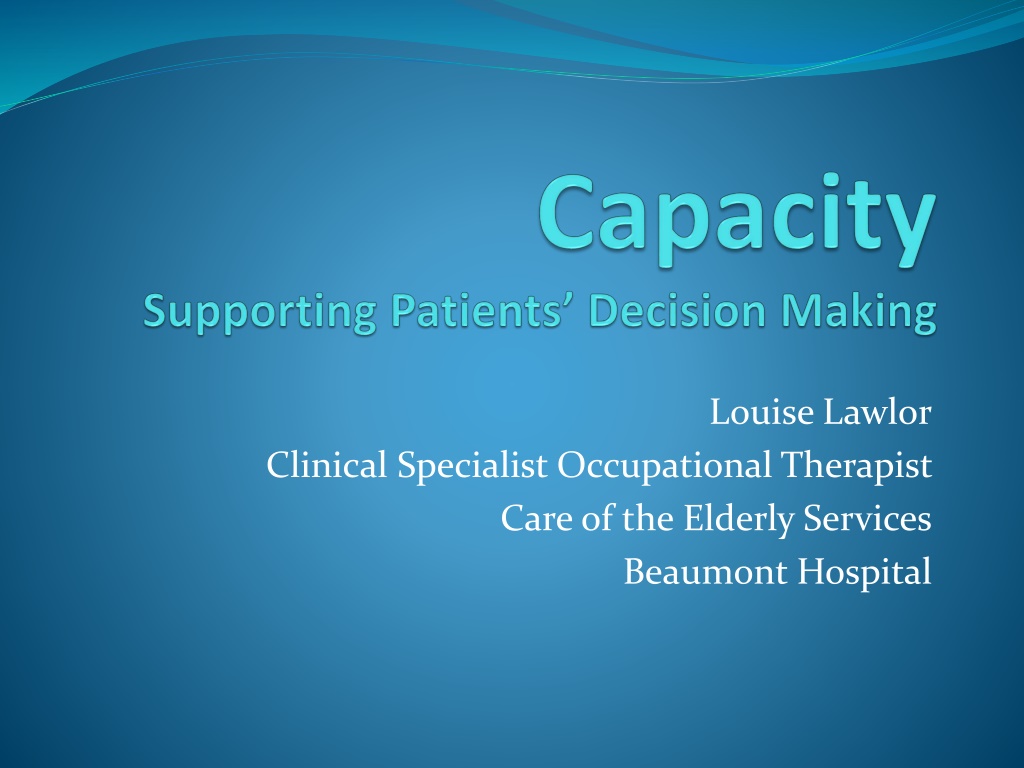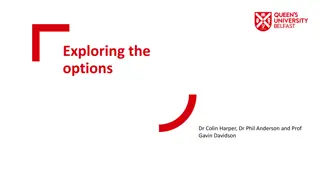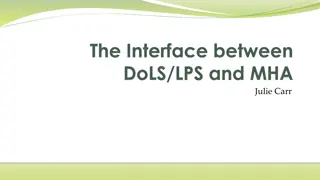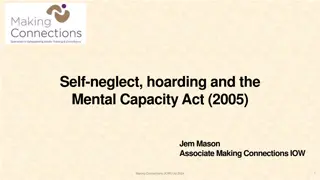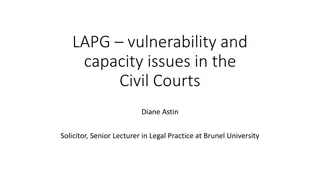Understanding Legal and Mental Capacity in Healthcare Decisions
Clinical specialist occupational therapist, Louise Lawlor, advocates for patients' rights and decision-making capacity in healthcare settings. She emphasizes the importance of legal and mental capacity in making informed decisions, highlighting relevant legislation, guidance documents, and a functional approach to assessing capacity. The presumption of capacity is a fundamental principle, irrespective of disability or other factors.
Download Presentation

Please find below an Image/Link to download the presentation.
The content on the website is provided AS IS for your information and personal use only. It may not be sold, licensed, or shared on other websites without obtaining consent from the author. Download presentation by click this link. If you encounter any issues during the download, it is possible that the publisher has removed the file from their server.
E N D
Presentation Transcript
Louise Lawlor Clinical Specialist Occupational Therapist Care of the Elderly Services Beaumont Hospital
Background Dementia in Acute Care Training Assisted Decision Making working party in Beaumont Hospital Advocate for HomeFirstethos in Frail elderly patients Embracing risk methodology in Occupational Therapy Worked in Neurology with patients with life limiting conditions Advocate for patients in terms of discharge planning Member of Multidisciplinary Team involved in supporting decision making
Definition Legal capacity is defined as being recognised as a person who can make decisions. It includes the capacity to be both a holder of rights and an actor under the law [the ability to exercise those rights]. Mental capacity is defined as the ability of a person to understand the nature and consequences of a decision to be made by him or her, in the context of the available choices at the time the decision is to be made.
Legislation Lunacy Regulation Act 1871 Powers of Attorney Act 1996 Advance Healthcare Directives Wards of Court Common Law functional approach generally supported Property matters primary focus but not rights Assisted Decision Making (Capacity) Act 2015 In the midst of legislative change not yet fully enacted
Guidance Documents HSE Consent Policy 2013 Guide to Professional Conduct and Ethics for Registered Medical Practitioners 8thEdition 2016 Supporting People s Autonomy: a guidance document. Health Information and Quality Authority 2016 Guidance document for HSCPs - Draft 2017
Functional Approach to Capacity Time and Decision Specific Weigh up the information provided Communicate a choice Capacity is defined as the person s ability to understand at the time a decision is to be made, the nature and consequences of the decision to be made by him or her, in the context of available choices at that time Assisted Decision-Making (Capacity) Act 2015: A guide for Health and Social Care Professionals (March 2017)
Presumption of Capacity Every person has capacity irrespective of Disability Behaviour Communication Difficulties Age Gender Beliefs Medical/Psychosocial condition And this should not be in question unless there is a clear trigger to indicate otherwise
Not triggers for questioning capacity What is deemed as an unwise decision Reports of concerns other than the individual that are not supported by evidence Decision goes against professional advice All of the information/options have not been provided Information provided has not been explained appropriately for needs of individual History of cognitive or communication impairment
Promoting Autonomy Supported by HIQA guidance document for staff and information leaflet for service users available Involves 6 steps: Respect the person s right to autonomy Avoid pre-judging Communicate appropriately to establish, explore and promote preferences Balance rights, risks and responsibilities Agree person-centred supports Implement and evaluate supportive actions
Balancing risks and rights Autonomy should be used to enable the individual to make decisions Allowing a compromised individual to do as they wish without appropriate assessment and support is NOT supporting autonomy Positive risk acknowledges the role of risk assessment in facilitating people s will and preferences Try to avoid blanket terms like unsafe and focus on needs assessment and appropriate interventions
Role of family / carers Common misconception that decisions can be made by Next of Kin No other person such as a family member, friend or carer and no organisation can give or refuse consent to a health and social care service on behalf of an adult who lacks capacity to consent unless they have specific legal authority to do so HSE Consent Policy (2013)
General advice for supporting decision making Be Specific Use clear communication Provide information Offer Choices Always remember ! Decisions are timeand issuespecific So neveran all or nothing approach but a continuum
Environmental Considerations Quiet environment- limit distractions Privacy - who should be present given the likelihood of delicate information Context - Formal interaction rather than bedside discussion Consider type of room avoid stimulating environment , ensure privacy via door signage
Hearing Impairment Written Information Quiet environment Avoid background noise or distractions Close to the patient as required Hearing aids Check understanding ask patient to repeat outcome to ensure they have understood all of the information
Cognitive Impairment Capacity assessment is nota memory test Written notes Written information leaflets that are easy to understand Options are clearly indicated Simplify information as required but not baby talk Avoid medical jargon/abbreviations Check understanding Repeat if necessary
Visual Impairment Large print if providing written information Use of contrast Avoid information leaflets with shiny effects/busy layout Quiet, distraction free environment Ensure patient aware of persons present Check understanding
Communication Deficits Referral to Speech and Language Therapist for advice specific to the patient s needs Use of simplified language If English not first language, use an official interpreter. It is not advisable/appropriate to use a staff member of the same nationality or family member. Clarity surrounding the main points Picture format alongside words Use of communication aids as appropriate e.g. Litewriter, alphabet board
Practice Considerations It is the responsibility of ALL staff to support patients to make decisions Consider supports required for patients Ensure your documentation reflects the interactions regarding decision making Useful to familiarise yourself with the Act and other guidance documents- available online Risk assessment and be specific with recommendations Case by case basis each situation is unique
Case 1 - Mary Mary is a 89 year old lady with a history of cognitive impairment. She presented to hospital following a fall. She lives in a bungalow, has a HCP of 3 calls daily and mobilises using a rollator zimmerframe. She has had a history of falls and urinary incontinence and a tendency to leave her used incontinence wear around the home. She is a smoker and has a number of old newspapers under the chair where she spends a lot of her time. She is requesting to return home however the MDT have a number of concerns regarding the risks associated with this decision. What are your thoughts?
Case 2 - Donal Donal has a diagnosis of Motor Neuron Disease. Recently, he has been having significant difficulty with his swallow. Following an assessment by a Speech and Language Therapist, a modified recommended. Donal does not enjoy the food he is currently eating and would prefer to eat other consistencies of foods. These are foods that could put him at risk of aspiration and choking. His family are concerned regarding his highlighted this issue to the team. diet has been behaviour and have What are your thoughts?
Case 3 - John John is a 68 year old man with COPD. He has had recurrent exacerbations and recent admissions to hospital. He had an ABG and 6 minute walk test and it has been recommended that he now have home oxygen in place. John reports he would not like to turn his house into a hospital and would like to return home without the oxygen in place. The respiratory consultant has advised John that the oxygen is essential and the risks of returning homewithout it in place. What are your thoughts?
Useful Further Reading HSE website : www.hse.ie HSE Consent Policy (2013) Guide to Professional Conduct and Ethics for Registered Medical Practitioners 8thEdition (2016) Supporting People s Autonomy: a guidance document. Health Information and Quality Authority (2016) Guidance document for HSCPs - Draft (2017) Embracing Risk: Enabling Choice. Royal College of Occupational Therapists (2018)
